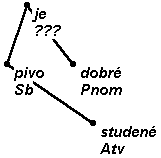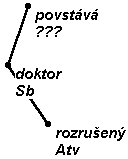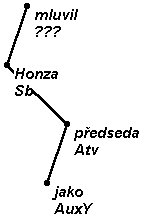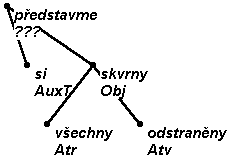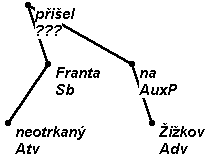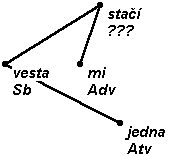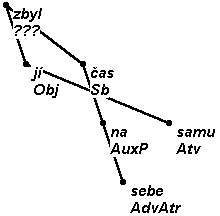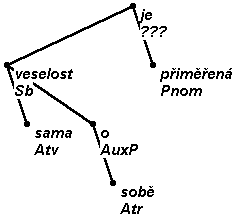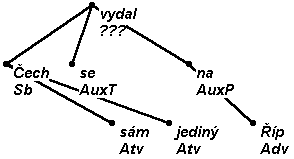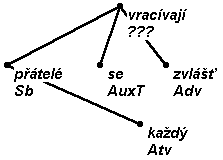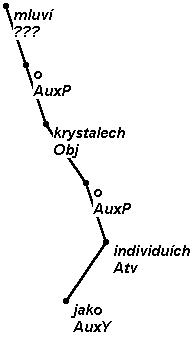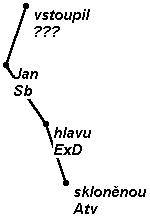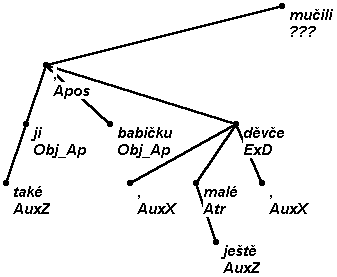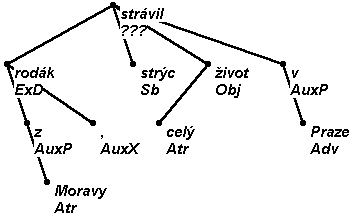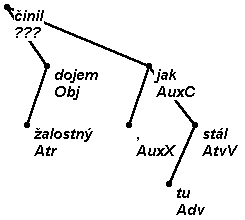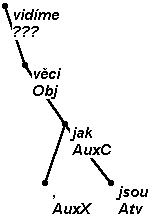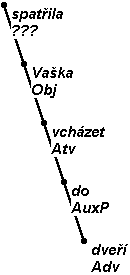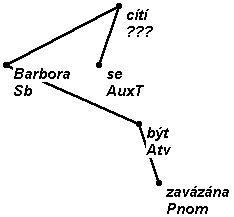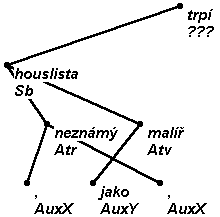In the part Definition of complement in defining complement we point out that our approach to this category is more restricted than that of Šmilauer's conception: as complement we regard only what he describes as complement not participating in government (doplněk nevazebný).
Since complement is traditionally described as depending on two members at the same time, we have to solve the question of where to suspend it in the tree; this problem is dealt with in the part Getting the complement suspended. Then we have to bring to the reader's attention that complement can easily be mistaken for some other sentence members. To avoid such mistakes, some instances are presented in the part Misinterpretation of complement; in the part Criteria for diagnosing the complement, criterions on which the decisions in this respect are to be based are formulated.
In the part Expressing the complement, possibilities in expressing complement will be shown. A complement can be expressed by a non-agreeing noun Complement expressed by a non-agreeing noun, a nominal adjective Complement expressed by adjective in nominal form, compound Complement expressed by an adjective in compound form or deverbative Complement expressed by a deverbative adjective, a pronoun or a numeral Complement expressed by an adjectival pronoun or a numeral, and it can also be introduced by the conjunction jako Complement introduced by the conjunction jako. As complements also transgressive constructions are regarded Complement expressed by a transgressive, a special but separate case of which are constructions of the type hlavu skloněnou ((having) head inclined) and the so-called French complements where the trangressive is elided Complement with elided transgressive. Further possibilities are subordinate clauses Complement expressed by a subordinate sentence and infinitives Complement expressed by infinitive.
One of the governing elements of a complement is, as a rule, a verb (predicate), which fact will be presupposed through the whole section. Exceptionally, however, situations can take place where this member is transformed into some other. We shall deal with them in the concluding part Complement with a transformed predicate.
In our conception only Šmilauer's determining complement (not participating in rection) is regarded as complement (Atv, AtvV), while the governed complement (doplněk doplňující - completing, rectional) is diagnosed as object (Obj - see the part Object after copulas and semi-copulas).
For technical reasons the complement is suspended on that of its "governing" members which is not a verb (i.e., on a noun or adjective), if, of course, such a member is present in the sentence. This is because this member determines the agreement. The complement obtains the function Atv from which the complement's dependence on the verb follows.
The complement with afun Atv is emphasized.
If, however, there is no second member in the sentence (it is either completely absent or it has been elided), the complement gets suspended on the verb (predicate) and it obtains the function AtvV.
The complement should not be mistaken for other kinds of sentence members, e.g., for nominal predicate (which might happen in contexts such as ex. (1)) or adverbial (ex. (3)).
It can even happen that a complement gets suspended on a copula (být) by the side of the nominal part of the predicate (Pnom). If, as the case may be, the second governing member (here the subject) is absent, the above mentioned rule is to be applied - the complement gets suspended on the verb (the copula, in this case) and obtains AtvV.
-
If an expression jako (meaning: as, playing the part of, etc.) occurs in a sentence (not being the case of a comparison described in Phrases of comparison with conjunctions jako (as), než (than)) and, at the same time, it is not governed by the valency of a verb (in such a case it would be an object - see the part Definition of complement), we shall assign to this conjunctive expression the function AuxY and to the pertinent expression Atv (AtvV).
-
If the word jako can be supplied to the sentence and the conditions stated in paragraph (1) are fulfilled, the assigned afun is complement (Atv), too.
-
-
The type máme uvařeno (we have finished cooking), máme plno (we have our place full) (AtvV).
-
Such expressions as rád (glad), sám, samoten, samotný (alone), všechen (all) prototypically represent complements (provided they are not in the position of Atr at a noun or of Pnom, i.e. following the copula být).
A non-agreeing noun can occur as a complement in fixed constructions of the type:
or in poetic sayings like
| žebrákem | půjdeš | světem | |||
| beggar-Instr | you-will-go | through-world |
Similarly it can be expressed by a prepositional case:
As a complement such words are regarded as jediný (the only), každý (each, every), první (first), všechen (all), samojediný (sole), samotný (alone), and nominal forms rád (glad), sám, samoten (alone) in non-attributive positions unless they represent Pnom after a copula (see also part Criteria for diagnosing the complement sub 5). All the three positions of the word sama are illustrated by ex. (6). The sentence in this example is understood as meaning the woman that was alone was the only one that was solitary.
Complements can be cumulated (ex. (7))
Mind phraseologized constructions as:
The complement expressed by a noun or adjective can also be introduced by conjunctions jako, jakožto - as (see part Criteria for diagnosing the complement). These conjunctions get suspended directly on the complement and obtain afun AuxY (see also part The conjunction jako introducing complement or object).
There can be more complement adjectives following one conjunction (exx. (6), (7)). This conjunction then gets suspended on the first of these complements while the second gets suspended alongside without any conjunction.
Transgressives fulfil the function of complement in the sentence. An exception is represented by absolute (incontinuous) transgressive constructions neither in agreement nor having subject in common with the verb. They are regarded as adverbials and marked Adv. (See the part Adverbial expressed by an adverb.)
The complement expressed by a transgressive is, as a rule, separated by commas. Since this is a systemic phenomenon, we do not regard this case as parenthesis. It would be assigned function Atv_Pa only if it were separated more distinctly (e.g., by parentheses). This represents one of the exceptions dealt with in A syntactically incorporated sentence part with <afun>_Pa.
The construction Jan vstoupil hlavu skloněnou/skloněnu (John entered, his head inclined) expresses dependence on the action (how did he enter?) and, at the same time, traditionally it is understood to depend on the name Jan, due to its agreement with this noun. Šmilauer speaks about "absolute accusative of property" pointing out that here the transgressive (maje, majíc, majíce - having) is elided, and classes these constructions with complement. We, however, miss an element that would make it possible to render exactly syntactic relations in the tree (the absent transgressive). Therefore we describe this type with the aid of afun ExD (see Ellipsis ExD, ExD_Co).
The word skloněnou (inclined) represents a classical complement (Atv) to the member hlava (head) and to the missing transgressive according to the part Complement expressed by a deverbative adjective.
Emphasis denotes the node with afun ExD, which remained after the complement was gone.
Cases of the so-called French complement can be dealt with in this connection, too, where, for the most part, an ellipsis of a transgressive takes place. The remaining noun then obtains afun ExD as well.
Following such content (autosemantic) verbs as pozorovat (observe), vidět (see), zahlédnout (catch sight of), slyšet (hear), přistihnout (catch), potkat (meet), představit si (imagine), znázorňovat (depict).
This concerns the so-called "Slavonic accusative with infinitive" after verbs like vidět (see), spatřit (see, perceive), slyšet (hear), cítit (feel); nechat (let).
An aid:
"spatřila Vaška (jak?) vcházejícího do dveří" - spatřila → vcházejícího, Vaška → vcházejícího (she saw Vašek enter(ing) the door)
In classical examples complement relates (as an embedded predication) to the verb and to some other nominal sentence member (having a different afun). By means of a transformation(i.e., through another secondary predication) the governing verb or the nominal part of the predicate (Pnom) can be changed into another nominal construction. In such cases (instead of the verb) the result of this transformation (nominalisation) of the predicate becomes the first governing member of the complement.
Such cases, however, will be treated in the same way as the classical dependent complements. This means that the complement gets suspended on the second "governing" (nominal) member and is marked Atv.
On the assumption that the sentence in the first example means That how we imagined the man as he was dying was shocking, the clause as he was dying constitutes the complement relating to the members image and man.




